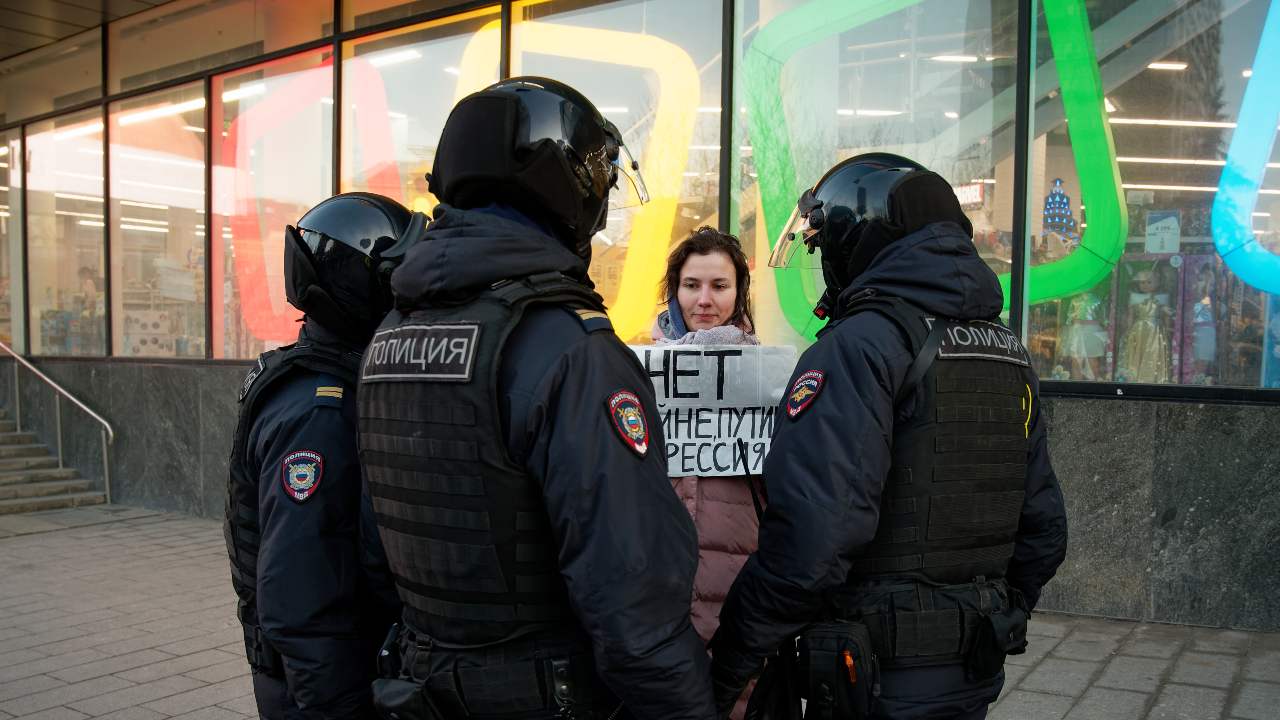Polling data from late September reveals a drastic change in the Russian public’s view of the war. Suddenly, the conflict is much closer to home.
Although the raw number of those supporting the invasion and Putin himself dropped by only a few points, there were noticeable trends among particular social groups, specifically younger people (those aged under 39).
There were already signs that since the end of the spring war fatigue had been growing, but last month’s numbers after the mobilization announcement showed something more dramatic.
Firstly, people started watching the news — those following the invasion of Ukraine spiked and surpassed even the March highs (68% against 64% respectively.) Some 77% of people said they knew about the Ukrainian offensive in Kharkiv, and that this news had provoked mostly negative emotions like fear, shock, and outrage.
Younger people, those aged 24 to 39, were a significant element of this trend. The same group also now expresses very considerably increased anxiety about the development of the conflict, although September’s findings showed anxiety levels reaching a peak for all groups: 88% of people said they are very worried (56%) or rather worried (32%) by events in Ukraine.
Secondly, there were changes in public opinion about the overall success of the “special operation” and the desired resolution to the war. The gap narrowed between those who would cancel the decision to start the “special operation” and those who would not: 51% of Russians are currently content with Putin’s decision to launch his war of conquest and 33% are not, a gap of 18% and a fall from 29% in March. More noticeably, the number of those saying the war is going smoothly dropped to 53% from 73% in June.
Finally, the number of people who believed the “special operation” was successful and those who believed the opposite almost converged. According to Levada’s September figures, the number of those backing peace talks exceeded those wanting to continue the war — by 48% to 44%.
Russia’s all-out attack on Ukraine in February and the recently announced mobilization have had distinct effects on public reaction and war support. When Russia began the all-out invasion, many people were able to ignore it and distanced themselves from the war. Sanctions hit, but their impact on the Russian economy was less significant than predicted.
This had allowed a substantial part of the population uninterested in political news and primarily focused on their private lives to continue doing so. This group included many young graduates, sometimes with families, who were building their careers. Lodged between war supporters and opponents, many of whom had already left during the first months of the war, those in the most apolitical part of Russian society had steered clear of the debate.
Mobilization changed this by making the issue deeply personal. Western estimates of perhaps 100,000 Russian dead and wounded in Ukraine may not have penetrated the public consciousness, but the message of hard fighting and high risk is clear.
Suddenly, the national leader decided to put many of them in harm’s way. Almost half the poll’s respondents told Levada they felt “anxiety, fear, and horror” and a quarter reported being “shocked” by the announcement of mobilization. Although the Russian government tried to frame mobilization as a means to upgrade social status, desperately trying to attract recruits among migrants (by promising them citizenship), prisoners (promising them freedom), and ordinary men (promising them money and hero status), many Russians were horrified by the possibility of dying in Putin’s war. There were protests in big Russian cities, those liberal middle-class hubs, with thousands of detained, and long lines of cars on the borders of countries like Kazakhstan and Georgia as younger men in particular sought to escape. Estimates suggest 700,000 or more people may have left since September 21.
Putin’s decision destroyed the social contract between the state and its citizens. This contract evolved after the dissolution of the Soviet Union: the state does not intervene in the private lives of the citizens, and in exchange, the latter doesn’t interfere in politics.
Now, this tacit agreement has come to an end. And although the active resistance does not seem very impressive (even if it is vast for Russia), an unprecedented shift is now underway. This is visible not only in poll numbers but also in acts of violence against the state – shootings or arson attacks on military commissariats.
Around 30% of Russians — those who tried to avoid the war or hesitantly supported it — are now forced to choose a side. They can join a pro-war camp responding to propaganda and future military losses. Or they can join the anti-war camp, and become increasingly alienated from the Russian state — by fleeing, committing acts of sabotage, or other malefactions.
The only thing they cannot do, however much they might want to, is to avoid the choice. Previous studies have demonstrated that state interventions into what is considered private life are the single most effective means to make apolitical people angry.
Putin chose to do it anyway. There will be consequences.
Dr. Natalia Savelyeva is a former Resident Fellow at the Future Russia Initiative with the Democratic Resilience Program at the Center for European Policy Analysis (CEPA). She is a sociologist who has studied at universities in Russia and the US, specializing in research on the conflict in Eastern Ukraine.




